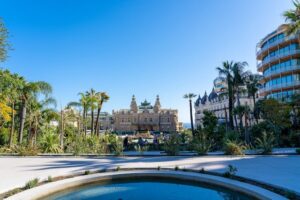Monaco is one of the world’s most exclusive destinations for wealthy expats seeking tax efficiency, political stability, and a luxurious lifestyle.
While the Principality is often described as a tax haven, it is in fact a fully regulated European financial center with strong transparency and compliance standards.
This article covers some of the most important expat investment advice in Monaco, from living there and how to gain residency, to how its tax system works. It also explores real estate costs and banking standards.
My contact details are hello@adamfayed.com and WhatsApp +44-7393-450-837 if you have any questions.
The information in this article is for general guidance only. It does not constitute financial, legal, or tax advice, and is not a recommendation or solicitation to invest. Some facts may have changed since the time of writing.

Does Monaco have taxes?
For income tax, no, Monaco does not impose personal income tax on residents, with the sole exception of French nationals.
This rule has made the Principality a magnet for high-net-worth individuals and entrepreneurs who want to preserve global income while remaining within Europe.
Additionally, there is no wealth tax, capital gains tax, or local property tax. The only major direct tax is the business profits tax (Impôt sur les Bénéfices), which applies to companies earning more than 25% of their turnover outside Monaco.
However, indirect taxes do exist. Monaco shares a customs and VAT system with France, meaning the standard VAT rate is 20%.
Other indirect levies include inheritance and gift taxes, which apply only to Monaco-situs assets and vary based on the relationship between the donor and beneficiary.
Transfers between spouses or direct descendants are typically exempt, while transfers to more distant relatives or unrelated individuals may incur progressive rates.
For most expats, the absence of personal income tax is the main draw, but it comes with an important caveat: French nationals remain taxable in France under a 1963 bilateral agreement.
Citizens of other countries must still respect their home country’s tax rules on worldwide income and should plan accordingly to avoid double taxation.
What is the corporate tax rate in Monaco?
Only firms conducting industrial or commercial activities that derive more than 25% of their turnover outside Monaco are liable for corporate income tax (CIT). The standard rate is 25%, aligned with many EU jurisdictions.
If a company earns the majority of its revenue within Monaco, it generally remains exempt from CIT.
However, determining this ratio requires clear bookkeeping, as the authorities will assess the source of turnover and substance of operations.
Activities such as consulting, trading, or services performed abroad are often considered external revenue and therefore taxable.
Corporate taxes also apply to Monaco-based branches of foreign entities, and transfer pricing principles follow OECD guidelines.
Dividends paid by Monaco companies are not subject to withholding tax. There are no capital gains taxes on corporate asset disposals unless the activity itself falls under the CIT scope.
Does Monaco have inheritance tax?

Yes. Inheritance and gift taxes in Monaco apply only to assets physically located in the Principality, such as real estate, bank accounts, or shares in Monaco-incorporated companies.
The rates depend entirely on the relationship between the deceased or donor and the beneficiary.
Transfers between spouses and direct descendants (children, parents) are fully exempt. Transfers to siblings are taxed at 8%, to nieces and nephews at 10%, and to unrelated individuals at 16%.
These taxes are assessed on the fair market value of Monaco-based assets at the time of death or gift.
Because Monaco does not tax non-Monaco assets, cross-border estate planning becomes crucial. Many expats use trusts or foreign holding companies to manage assets located elsewhere.
Monaco recognizes trusts established under foreign law through Law No. 214, allowing nationals of trust-law countries (such as the UK or certain Commonwealth states) to register their trusts locally.
Importantly, Monaco does not impose forced-heirship rules, allowing residents greater flexibility in how they distribute their estates.
However, the absence of domestic inheritance tax treaties means assets located abroad may still attract taxation in their country of situs.
In practice, Monaco’s approach of limiting to local assets and making exemptions for close family makes it one of the most succession-friendly jurisdictions in Europe.
Proper structuring ensures both compliance and confidentiality while minimizing exposure to double taxation elsewhere.
Starting a Business in Monaco
Before incorporation, every new business in Monaco must secure government authorization, regardless of legal form. The process verifies the company’s proposed activity, capital origin, and qualifications of its directors.
Financial services, investment management, and advisory activities additionally require licensing by the Commission de Contrôle des Activités Financières (CCAF).
This system makes Monaco attractive for legitimate, high-value enterprises with real operations, while discouraging shell companies and opaque structures.
Company structures most common among expats include:
- Société Anonyme Monégasque (SAM) – a public limited company requiring €150,000 in paid-up capital, notarized statutes, and prior government authorization. It suits larger businesses or family offices with multiple shareholders.
- Société à Responsabilité Limitée (SARL) – a private limited company with €15,000 minimum capital, simpler governance, and limited liability for members. It is suitable for small or service-oriented enterprises.
Living in Monaco: How to Become a Monaco Resident
Monaco has no formal golden visa, but obtaining residency is straightforward for financially capable applicants. Any foreigner intending to live in Monaco for more than three months must apply for a Carte de Séjour, the country’s residence permit.
To qualify, applicants must demonstrate:
- Accommodation – proof of ownership or a long-term rental contract within Monaco.
- Financial means – typically shown through a bank letter of guarantee or deposit, often requiring at least €500,000–€1 million in liquid assets for credibility.
- Clean criminal record – police certificates from recent countries of residence.
- Health insurance – full coverage valid in Monaco and the Schengen area.
The process begins with securing housing, opening a bank account in Monaco, and preparing documentation for the Public Security Department.
After approval, the applicant attends an interview and biometric registration. The initial temporary residence card is valid for one year and renewable.
After ten consecutive years of residence, an individual may qualify for the 10-year “Privileged” card, which provides long-term stability.
Residency in Monaco automatically confers tax residence for most practical purposes, provided the individual spends more than six months per year in the Principality.
There is no minimum-stay enforcement, but maintaining a real, demonstrable presence is important for compliance with international tax standards.
How much is real estate in Monaco?
The average price per square meter for real estate resales in Monaco reached €51,967 in 2024. Monaco’s property market is among the most expensive in the world, characterized by limited supply, high liquidity, and strict regulation.
Although there is no annual property tax, real estate transactions incur significant one-time acquisition costs and VAT on certain new developments.
For resale properties:
- Transfer duties: Approximately 4.5% of the purchase price for individuals or transparent entities, and 7.5% for opaque corporate structures.
- Notary fees: Roughly 1.5% of the transaction value.
- Stamp duty on share transfers: 4.5% when buying shares of a property-holding company instead of the property itself.
For new constructions or major renovations:
- Subject to VAT at 20%, consistent with France’s tax regime (Monaco is part of the French customs and VAT area).
- Buyers should confirm with their notary whether VAT replaces transfer duty or applies in addition, depending on the property type and transaction structure.
Ownership and leasing rules:
- Foreigners can purchase property freely with no restrictions.
- Rental income from Monaco property is not subject to income tax locally, but it may be reportable in the landlord’s home jurisdiction.
- The rental market is divided into regulated and liberal segments. Regulated units are older, often rent-controlled; newer developments follow market pricing.
- Lease deposits, tenant protections, and eviction procedures follow specific Monegasque civil law norms and should always be reviewed with a local notary or property lawyer.
Because of limited land and perpetual demand, property values in Monaco tend to be resilient, functioning more as a store of wealth than as a speculative investment.
Buyers should plan total acquisition costs in the 6–9% range to account for taxes, notary, and administrative fees.
Can expats open bank accounts in Monaco?
Yes, but banking in Monaco is designed primarily for high-net-worth individuals and family offices. Opening an account is possible for most foreign residents, yet it involves stringent compliance checks and substantial minimum deposits.
Typical requirements and standards:
- Minimum deposit: Usually between €500,000 and €2 million, depending on the bank and relationship model.
- Documentation: Proof of identity and residence, source of wealth documentation, recent bank references, and tax compliance declarations.
- In-person onboarding: Most banks require at least one in-person meeting to finalize KYC (Know Your Customer) and AML (Anti-Money Laundering) checks.
- Banking options: Private banking, investment management, and custody accounts; retail or transactional banking is limited.
Major institutions in Monaco include UBS, Julius Baer, Pictet, Rothschild & Co, HSBC Private Bank, and Banque Havilland.
These banks typically offer multilingual private bankers, investment advisory services, and access to discretionary portfolio management.
Transparency and compliance:
- Monaco participates in the OECD’s Common Reporting Standard (CRS), automatically exchanging account information with over 100 partner jurisdictions.
- It also complies with FATCA for US clients, though some banks limit or exclude US citizens due to compliance burdens.
- The Service d’Information et de Contrôle sur les Circuits Financiers (SICCFIN) oversees AML enforcement, requiring banks to verify source of funds and monitor transactions continuously.
For expats, it is worthwhile to prepare full documentation on income and assets before approaching a bank. Relationships are integral, so it is recommended to find law firms, accountants, or wealth managers that can accelerate the process.
Choose banks aligned with your nationality and investment goals; not all accept clients from every jurisdiction. Ensure compliance with your home-country reporting obligations, since Monaco no longer offers banking secrecy.
While the barrier to entry is high, Monaco’s private banks provide world-class portfolio management, estate planning, and cross-border investment services for those who qualify.
Pained by financial indecision?

Adam is an internationally recognised author on financial matters with over 830million answer views on Quora, a widely sold book on Amazon, and a contributor on Forbes.



